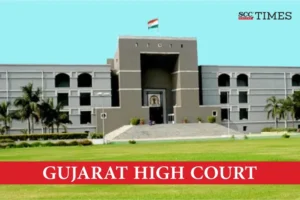Gujarat High Court: In a criminal application under Section 389(1) of the Code of Criminal Procedure, 1973 (‘CrPC’) for suspension of sentence awarded to Asaram Bapu by the Trial Court for the offences punishable under Sections 376 and 377, 354, 342, 357, 506(2) of the Penal Code, 1860 (‘IPC’), the Division Bench of Ilesh J. Vora and Vimal K. Vyas, JJ. dismissed the application for suspension of sentence.
In the impugned decision, Asaram Bapu was sentenced to life imprisonment for offences punishable under Sections 376, 377 of the IPC. He was sentenced to imprisonment of one year each for offences under Sections 354, 357 and 506(2) of the IPC and six months for offence under Section 342.
Background
Asaram Bapu on the path of spirituality built his first ashram in 1972 and slowly the activities of the ashram spread over in the other field like Mahila Ashram, manufacturing of Ayurvedic medicines and other allied products, printing press, and gurukul and therefore, he was in limelight because of his religious discourses and other social activities and for maintenance of these, Sadhakas and/or Sevikas, joined with the ashram.
The prosecution’s case was that parents of the victim were his devotees and used to take visit at Surat Ashram. The victim rendered her services as a Sevika and stayed in the ashram, Motera, Ahmedabad from 1997 to 2007. It is alleged that during the stay at Motera ashram, she was abused sexually and illegally confined by Asaram and six other co-accused persons including his daughter, wife, and others who were acquitted of charges. As per the FIR, Asaram told victim that she had potential to become a great orator and hence was asked to do rituals (anusthan) for about 11 days at Mahila Ashram. After completion of Anusthan, she sought a permission to leave the Ashram, but the head of the office did not allow her to leave the ashram.
Later, on the pretext of removing worldly desire of materialistic life, Asaram convinced the victim that he has to undertake the rituals (vidhi) for which she was taken to Shanti Vatika and there was forceful sexual intercourse. Later, she was promoted as orator and as per the ashram program, she delivered religious discourses at the different places. However, she was still forced for sexual favours and out of fear, awe and influence, she could not tell anybody of the conduct and attitude of Asaram Bapu. Later, in 2007 she managed to run from the ashram. When Asaram Bapu was arrested by Jodhpur Police in connection with the complaint filed against him for offence under Section 376 of the POCSO Act, victim gathered the courage to file complaint against him. The Government constituted a Special Investigation Team and accordingly, after arresting Asaram Bapu, sufficient material was found against him. Subsequently, the Trial Court, found him guilty and sentenced him to suffer life imprisonment.
Whether a case for suspension of sentence was made out?
Referring to Section 389(1) of the CrPC, the Court explained that it enjoins upon the Appellate Court the power to pass an order for the suspension of sentence or order of conviction during the pendency of an appeal. The Court referred to Rajesh Ranjan Yadav v. CBI, 2007 (1) SCC 70, wherein it was observed that there is no absolute and unconditional rule about when bail should be granted. Further, the Court relied on Ash Mohammad v. Shivrajsinh , (2012) 9 SCC 446, wherein, while examining post-conviction bail, the Court emphasized on proper analysis of criminal antecedents. It was observed that the question should be whether the accused deserves to be enlarged on bail or not and only thereafter, the question of imposing of conditions would arise.
In the matter at hand, the Court perused the impugned decision of the Trial Court and noted that the Trial Court relied on sole evidence of the victim and assigned proper reasons for relying on the evidence of the victim, wherein, no infirmities or lacuna were found in her evidence. The Court also noted that the Trial Court had taken in-depth analysis of the delay in FIR and was fully satisfied with the explanation offered by the victim regarding the atmosphere of fear created by Asaram’s devotees. Further, the activities of the ashram were examined, and several witnesses threw light on the Asaram’s pervert mind. Several witnesses, who were sexually abused by him were also examined by the Trial Court. Hence, the Court on perusal of the strong reasoning given by the Trial Court in the impugned decision for placing solely relying on victim’s evidence opined that there was no patent infirmity in the order of conviction, and it cannot be said that the order prima-facie on face of it was erroneous.
Further, the Court opined that the grounds raised challenging the order of conviction particularly, false case being registered against Asaram Bapu, the delay in lodging the FIR and inter-se rivalry of the devotees and other grounds like conspiracy etc., required to be considered at the time of final hearing of the appeal. The Court also took note of several instances where witnesses and their families have faced accidents, assaults and have been threatened. The Court said that the institution of cases at different places was major ground for these incidents. Thus, considering the totality of the circumstances, the ground of possible delay in appeal and medical ailment, as well as ten years completion in jail, the application for suspension of sentence was refused to be allowed.
[Ashumal v. State of Gujarat, 2024 SCC OnLine Guj 3413, decided on: 29-08-2024]
Advocates who appeared in this case :
For the applicant: Senior Advocate Yogesh Lakhani, Advocate Ashish M. Dagli
For the respondents: Senior Advocate BB Naik, Advocate Ekant Ahuja, SP PP RC Kodekar, APP LB Dabhi

